Nurses' Narratives - Sister E H Cuthbert - December 1914 to April 1915
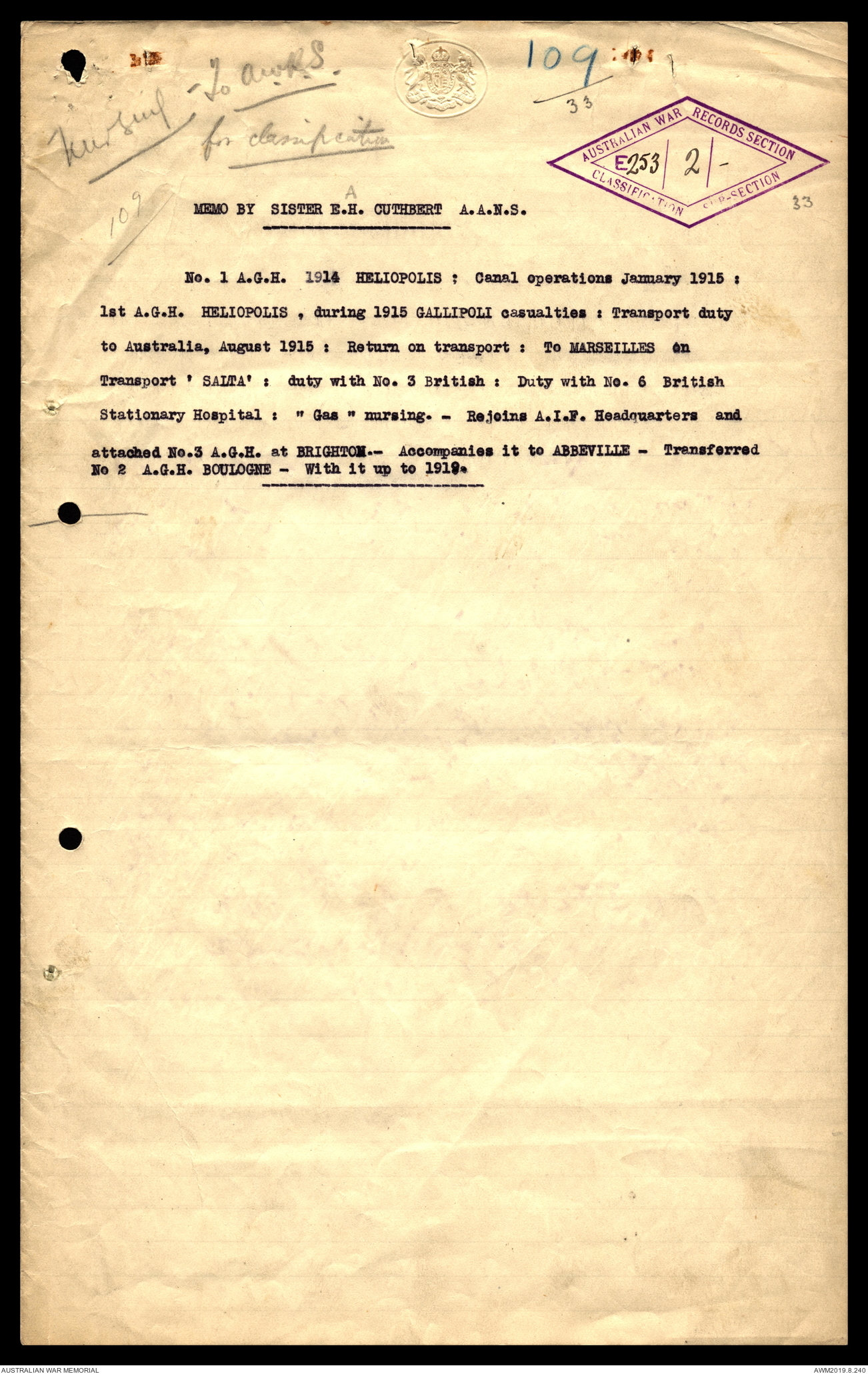
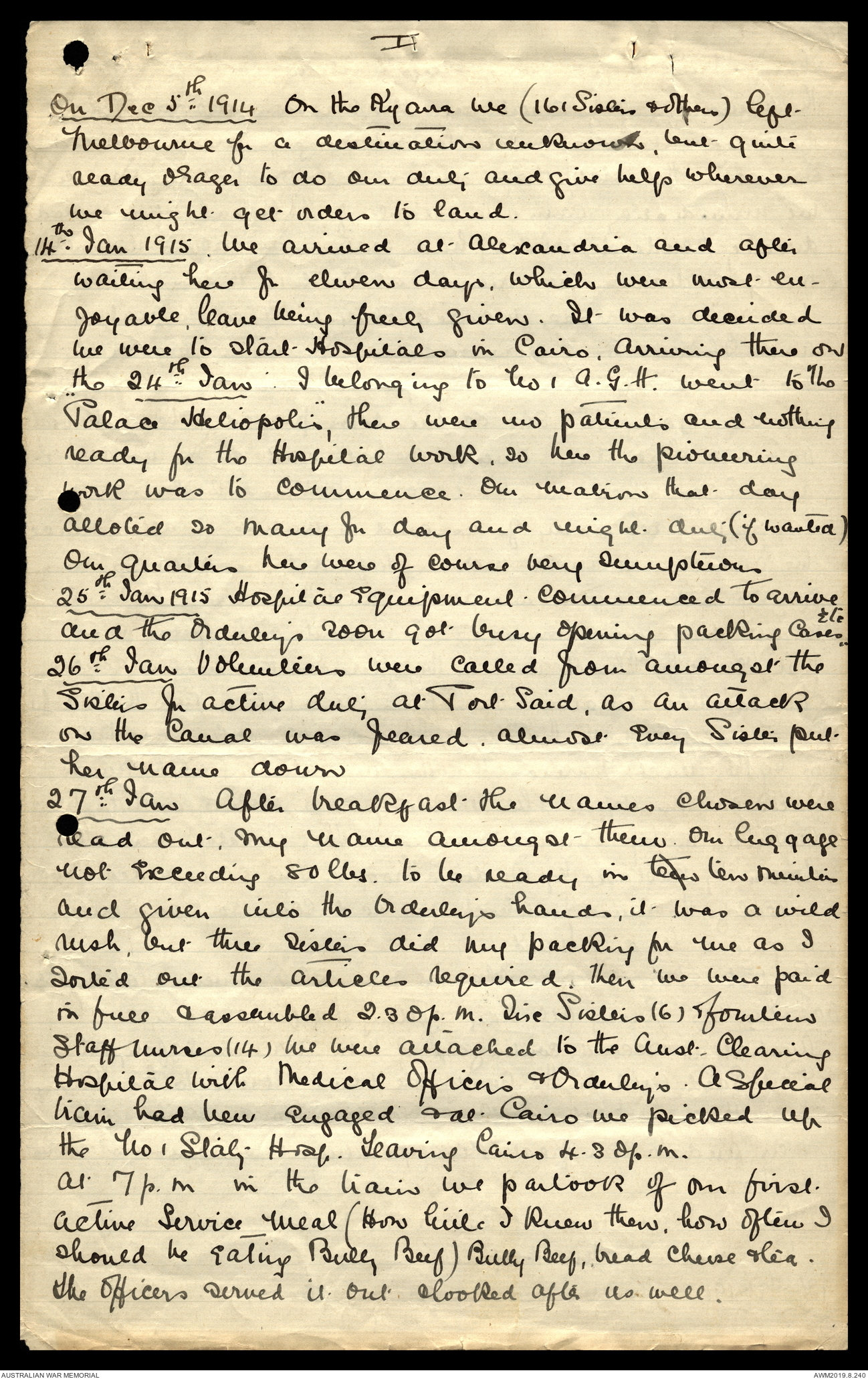
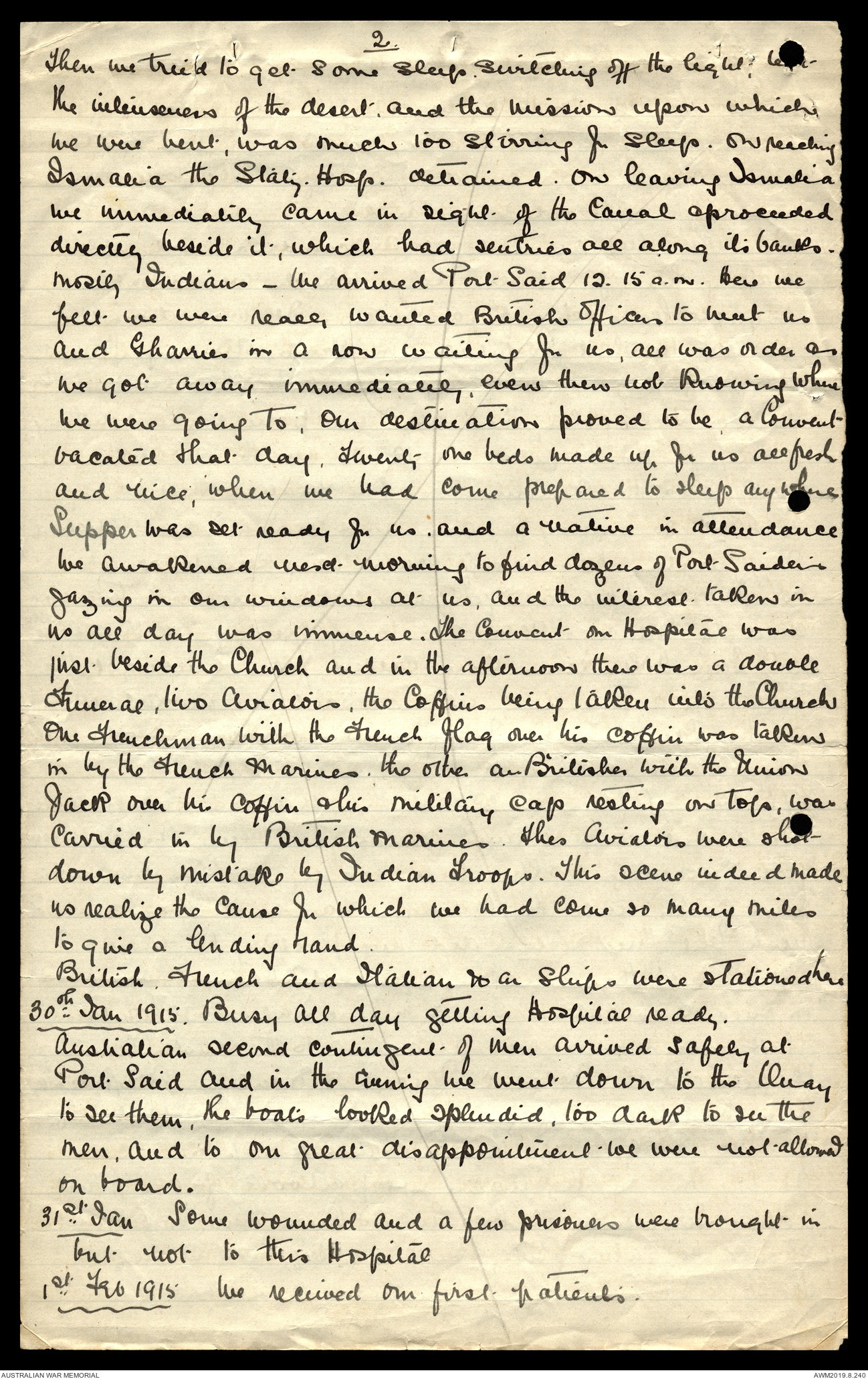
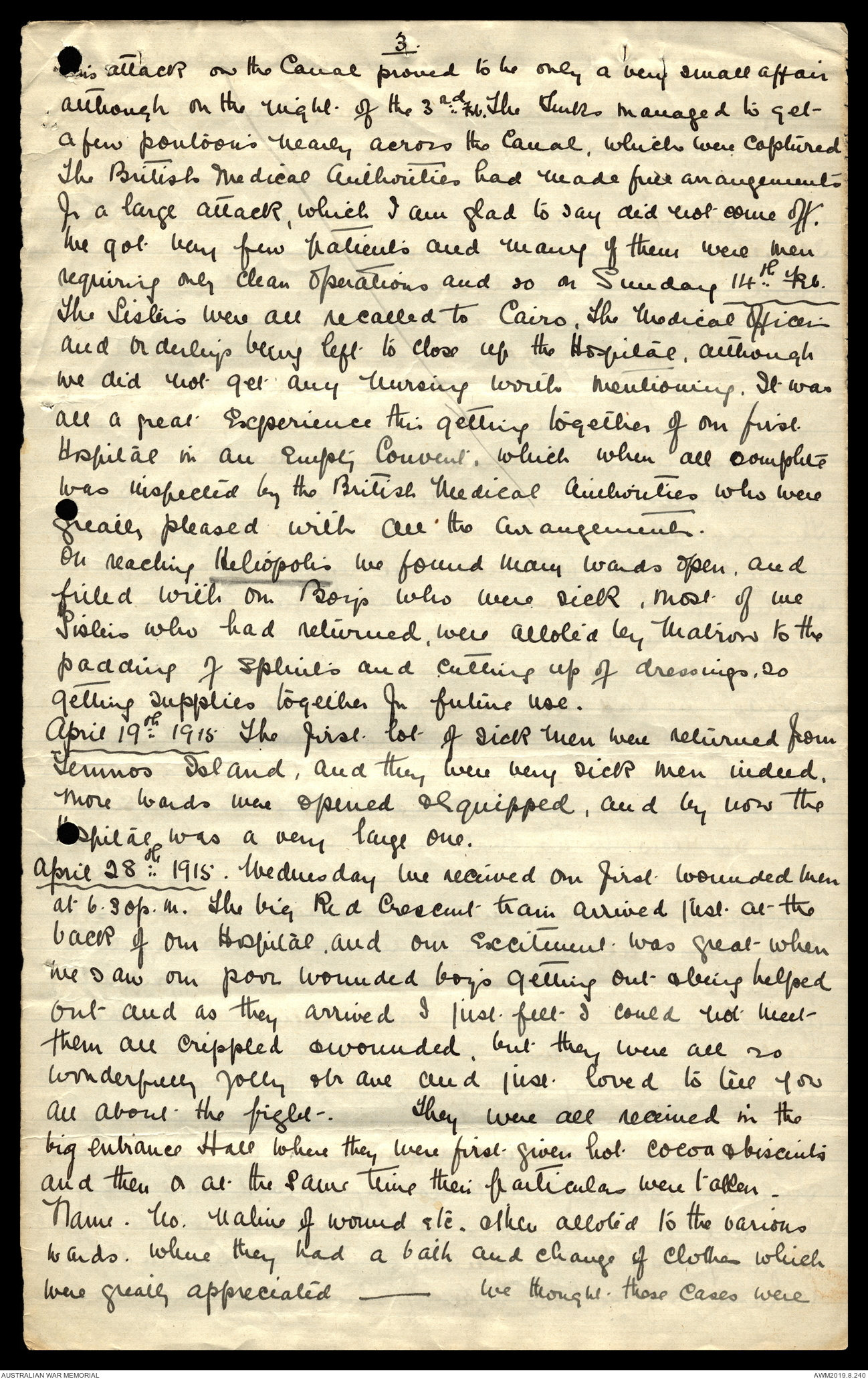
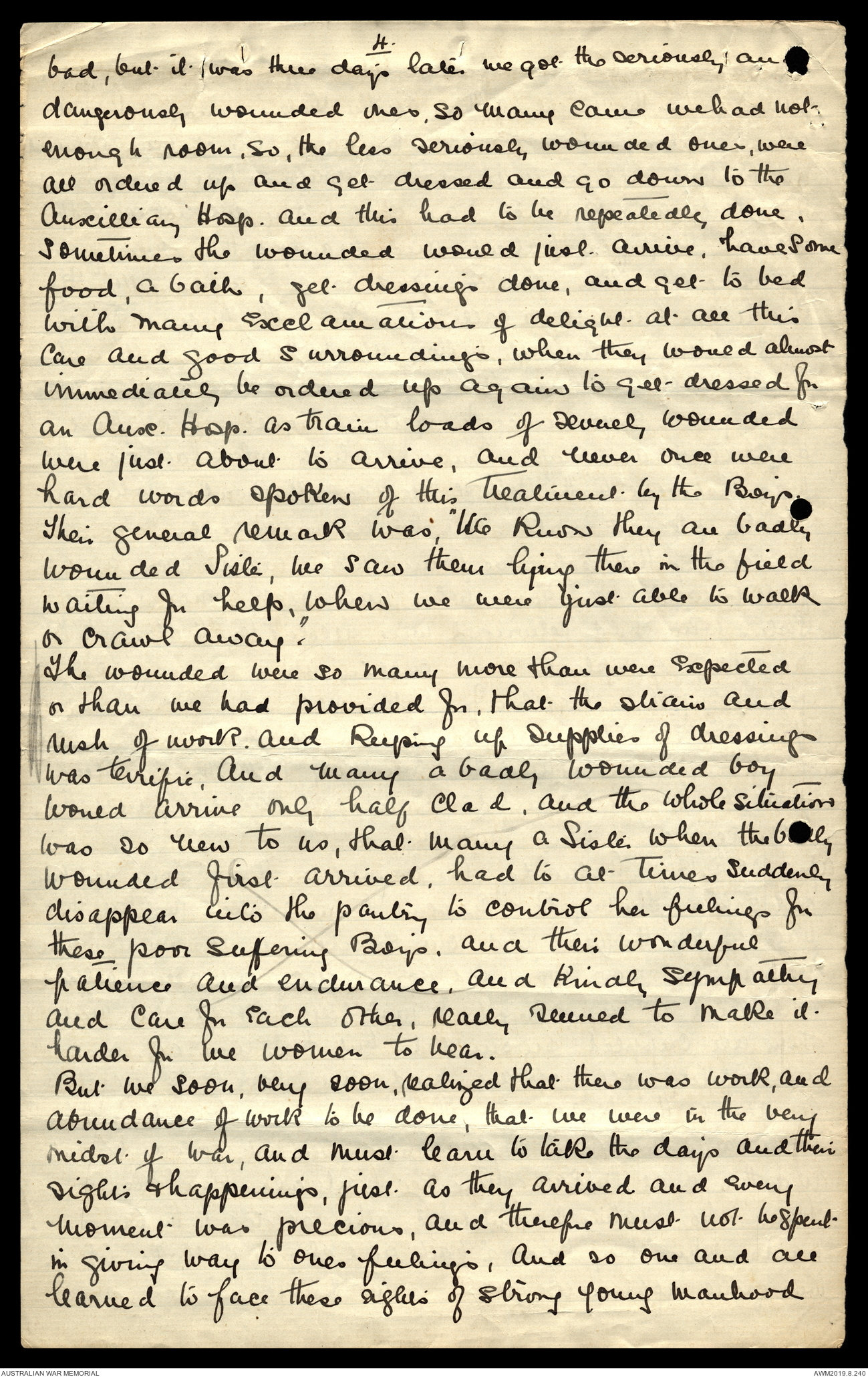
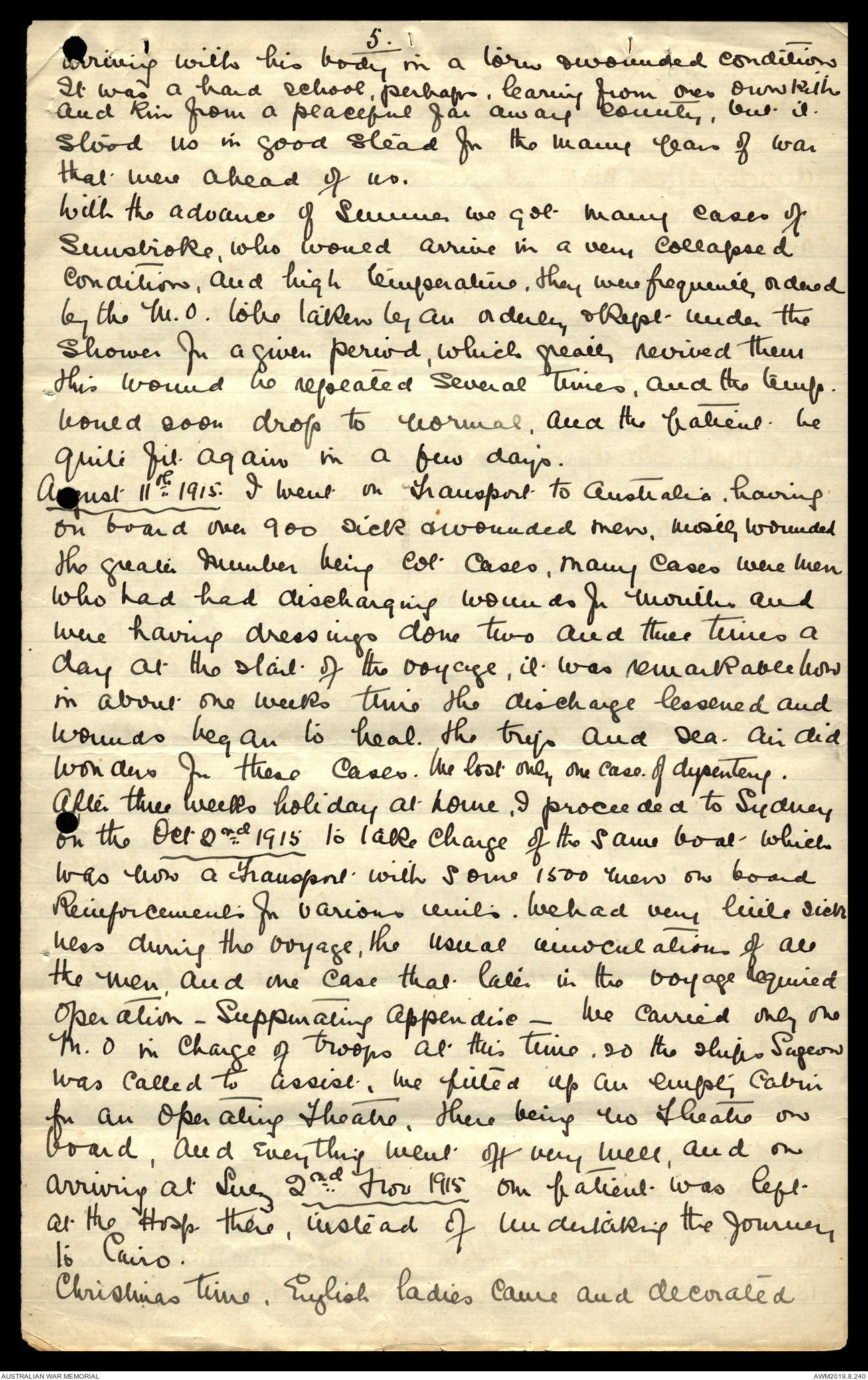
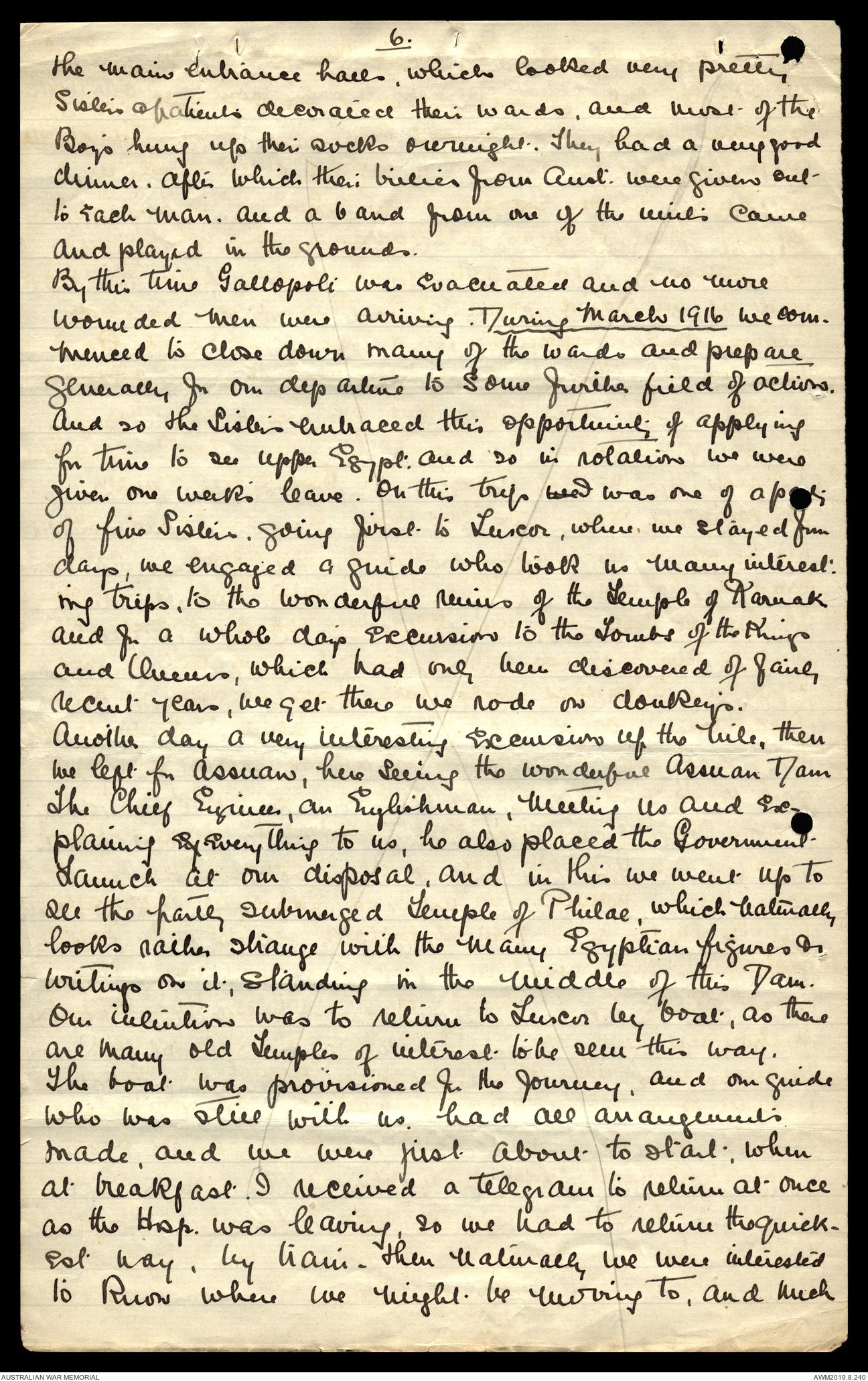
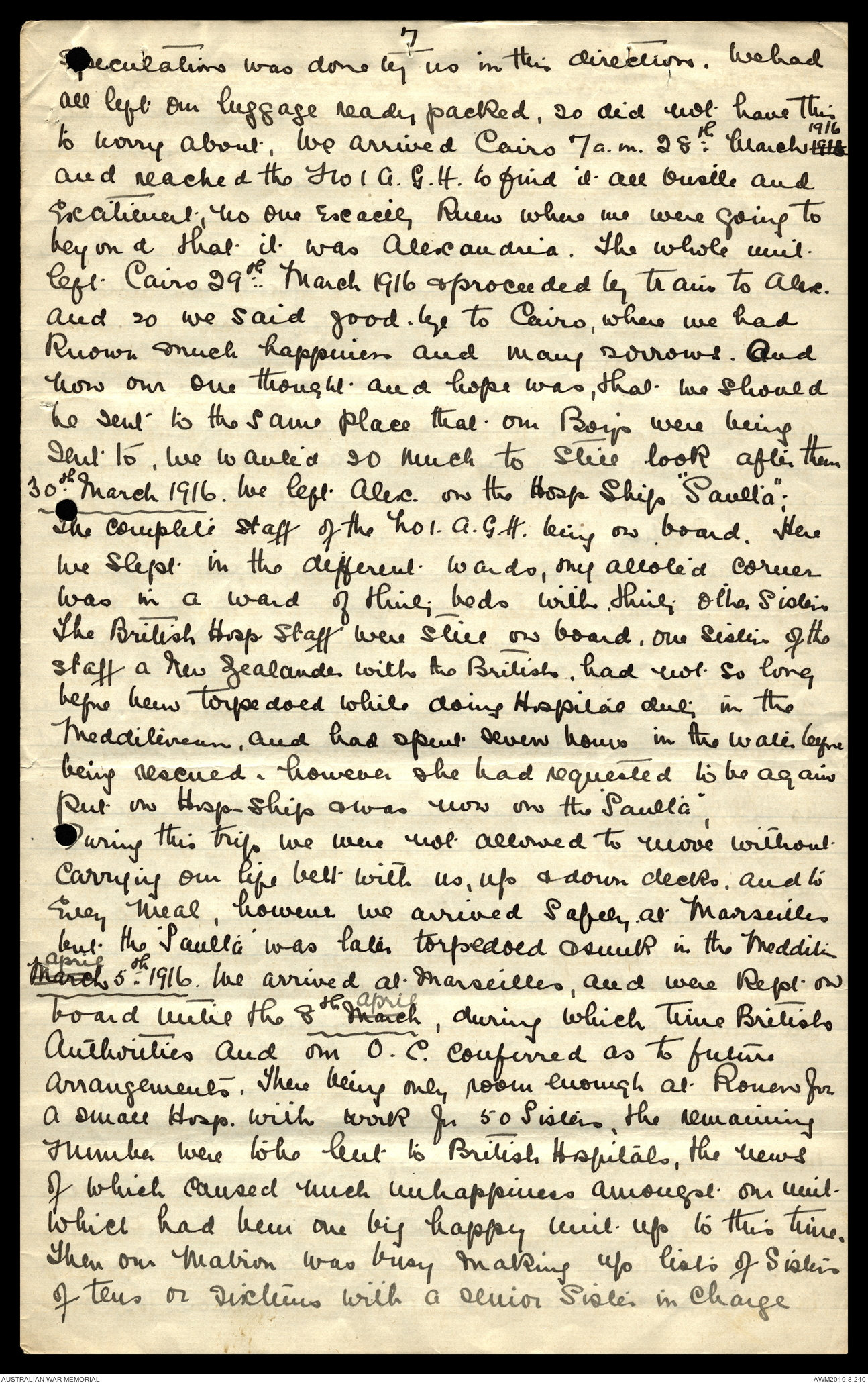
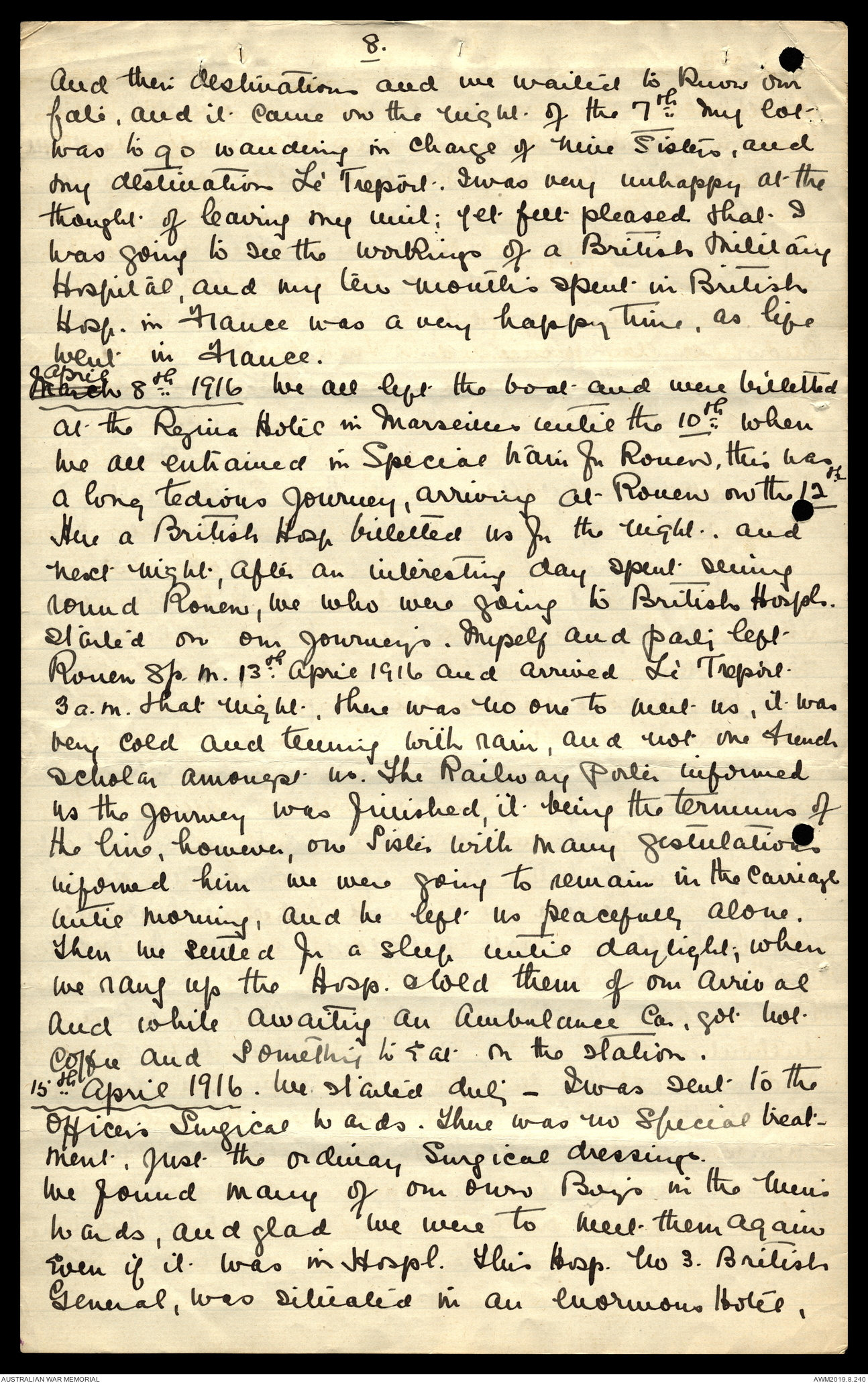
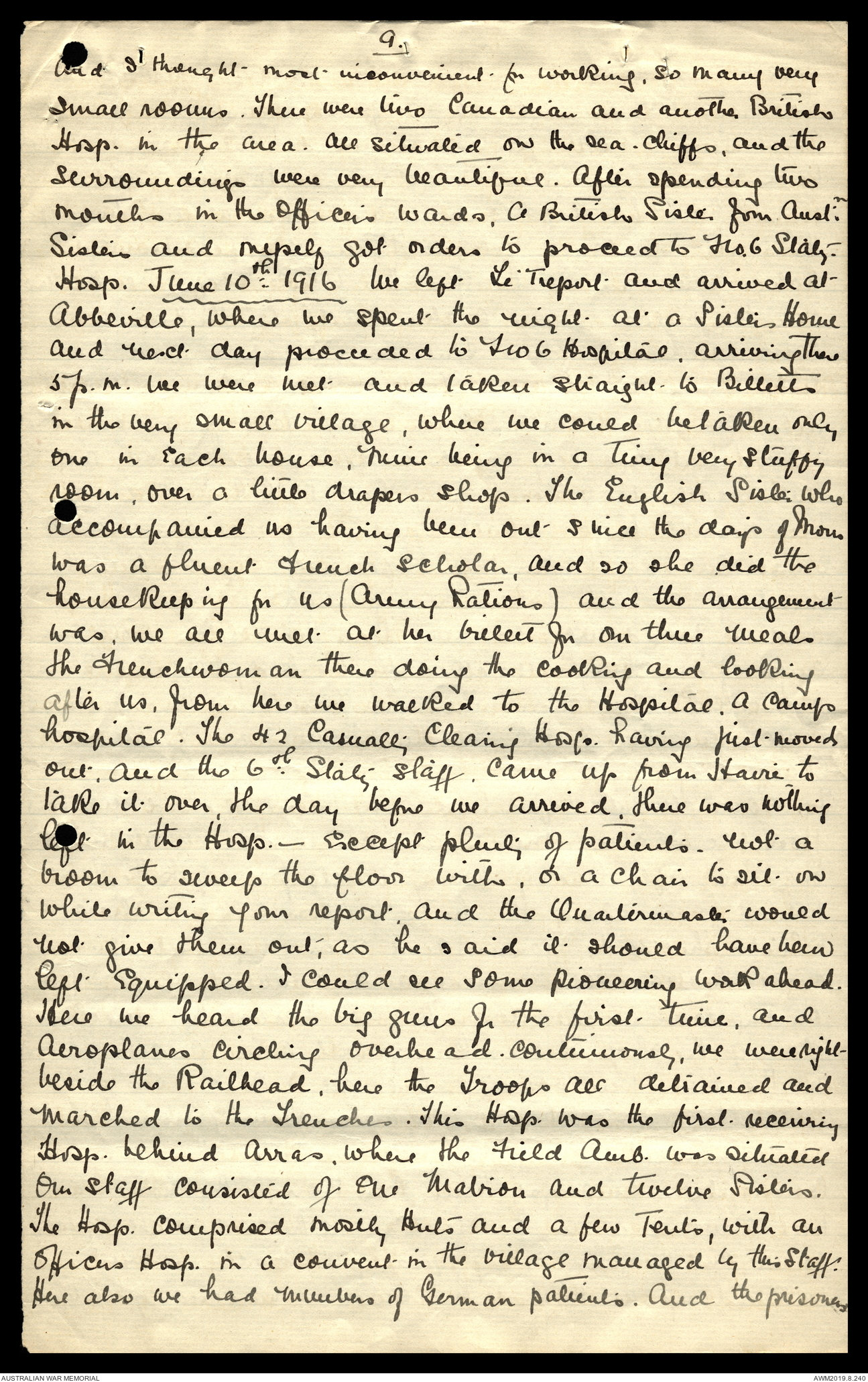
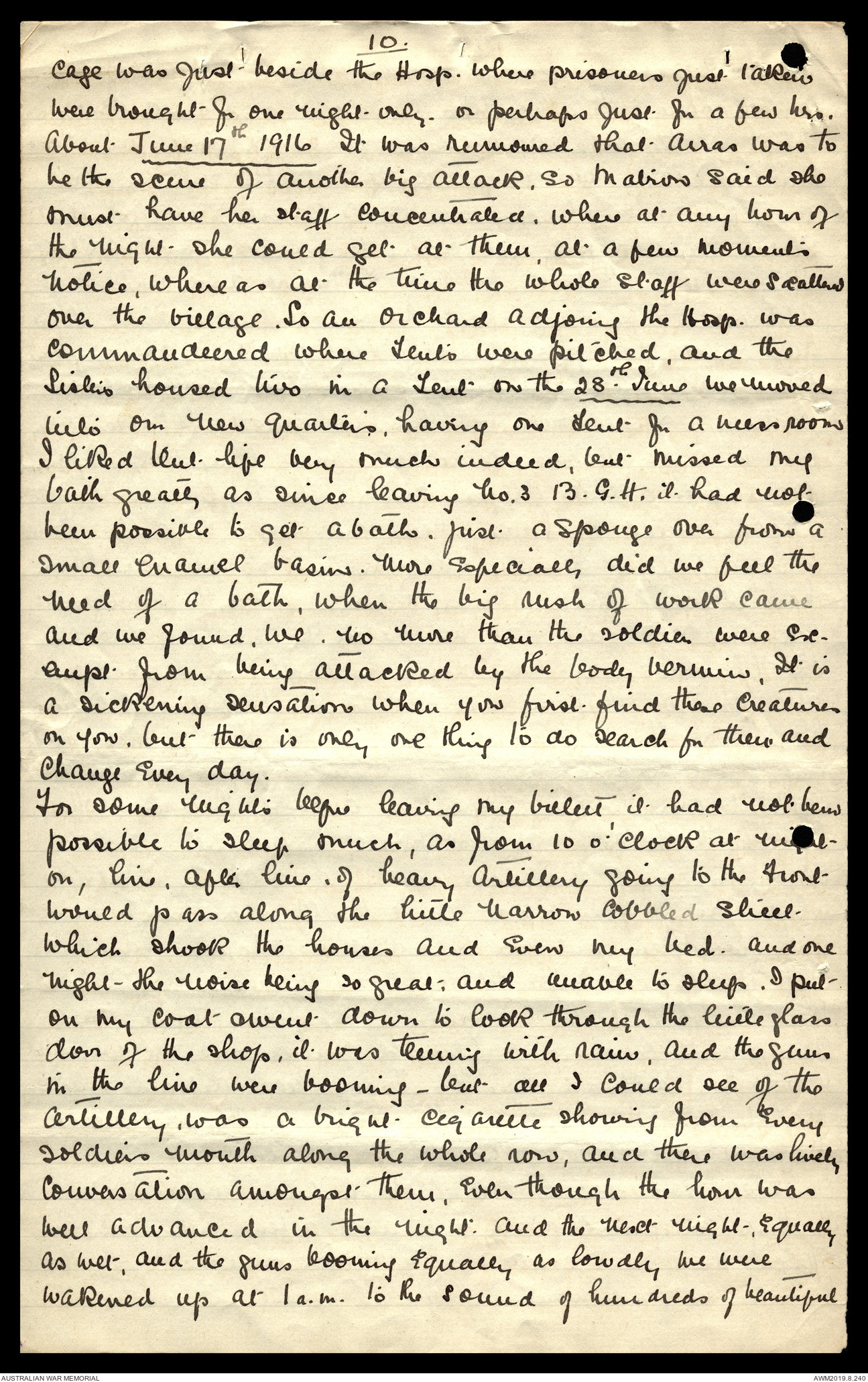
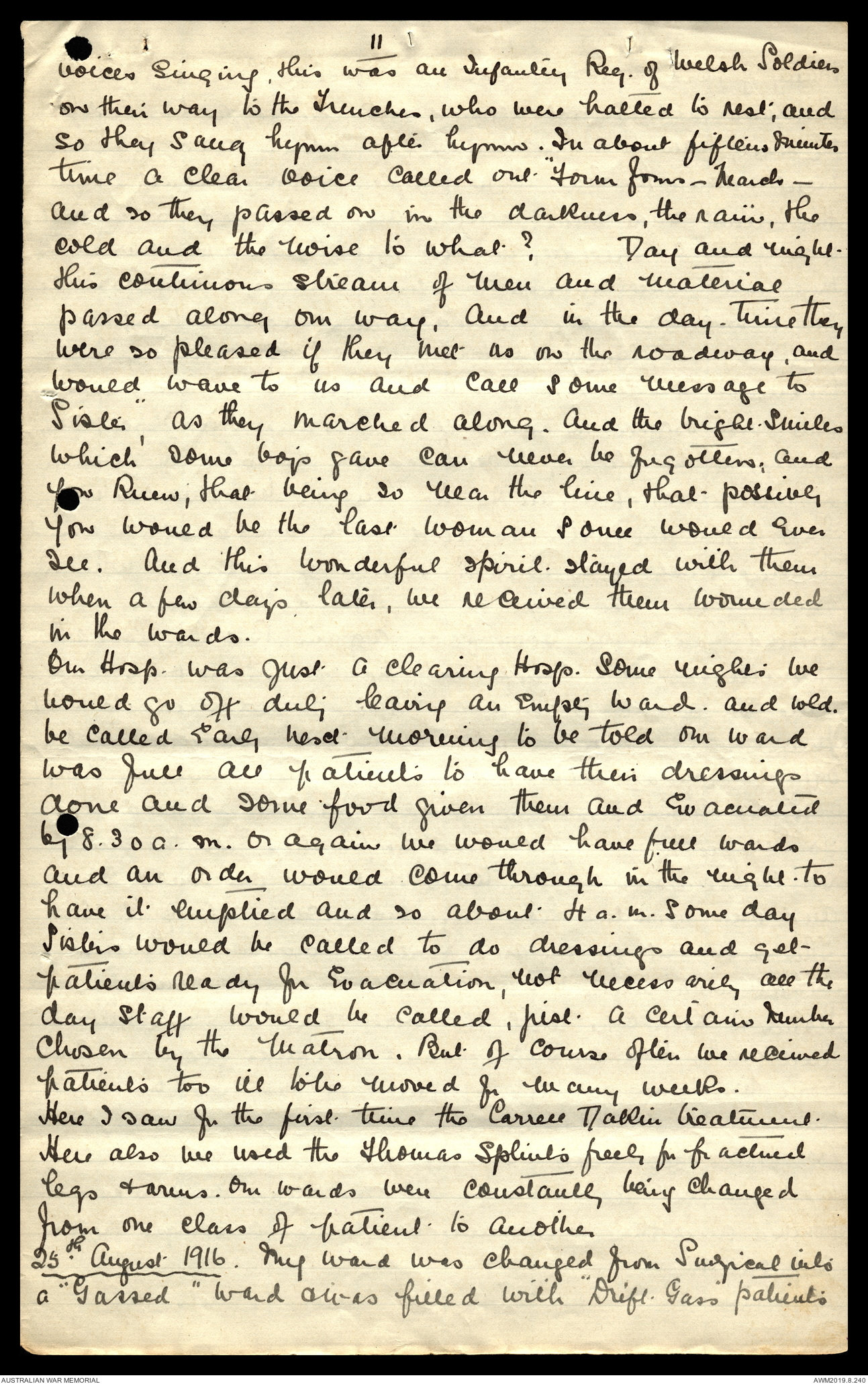
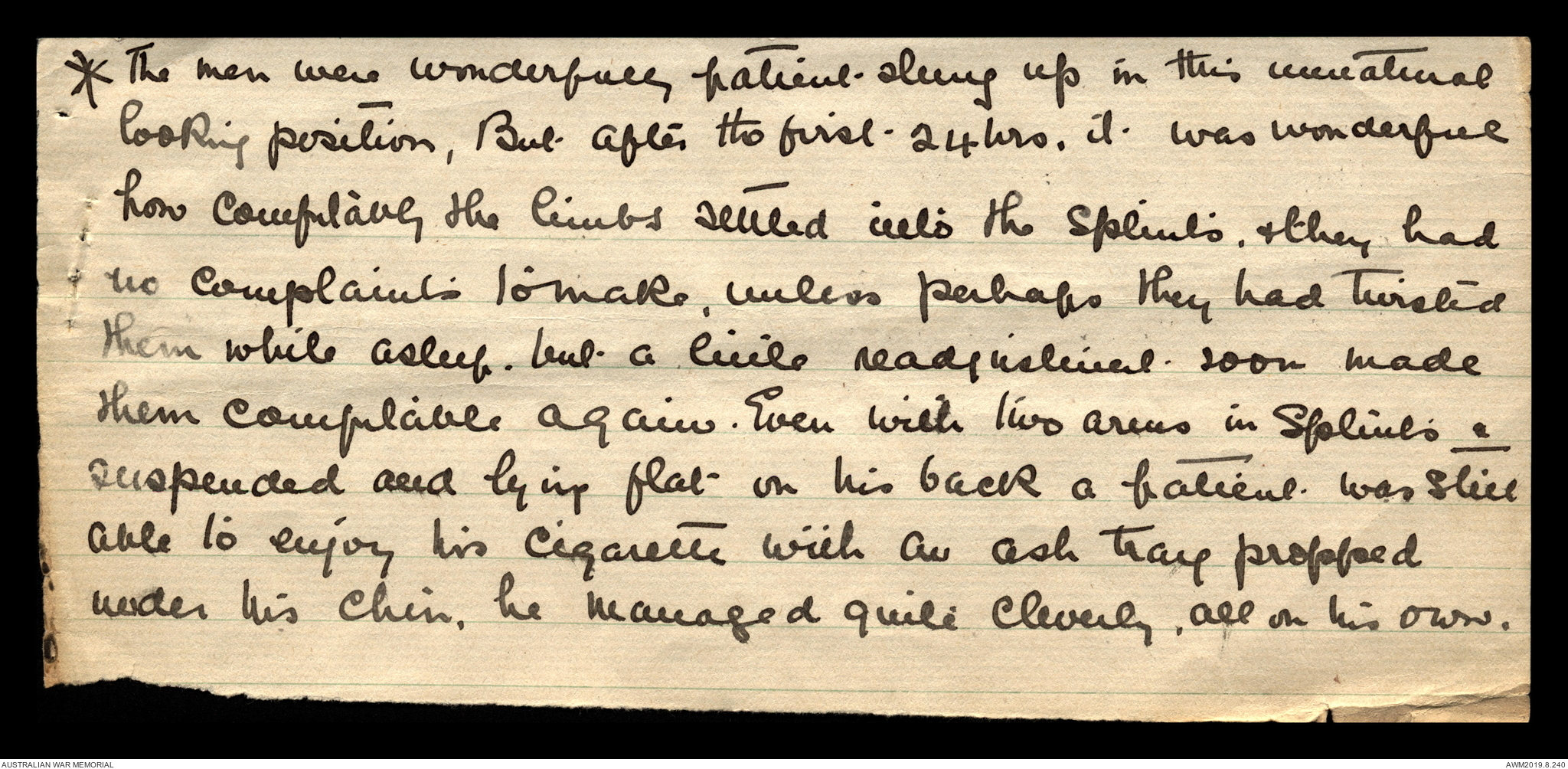
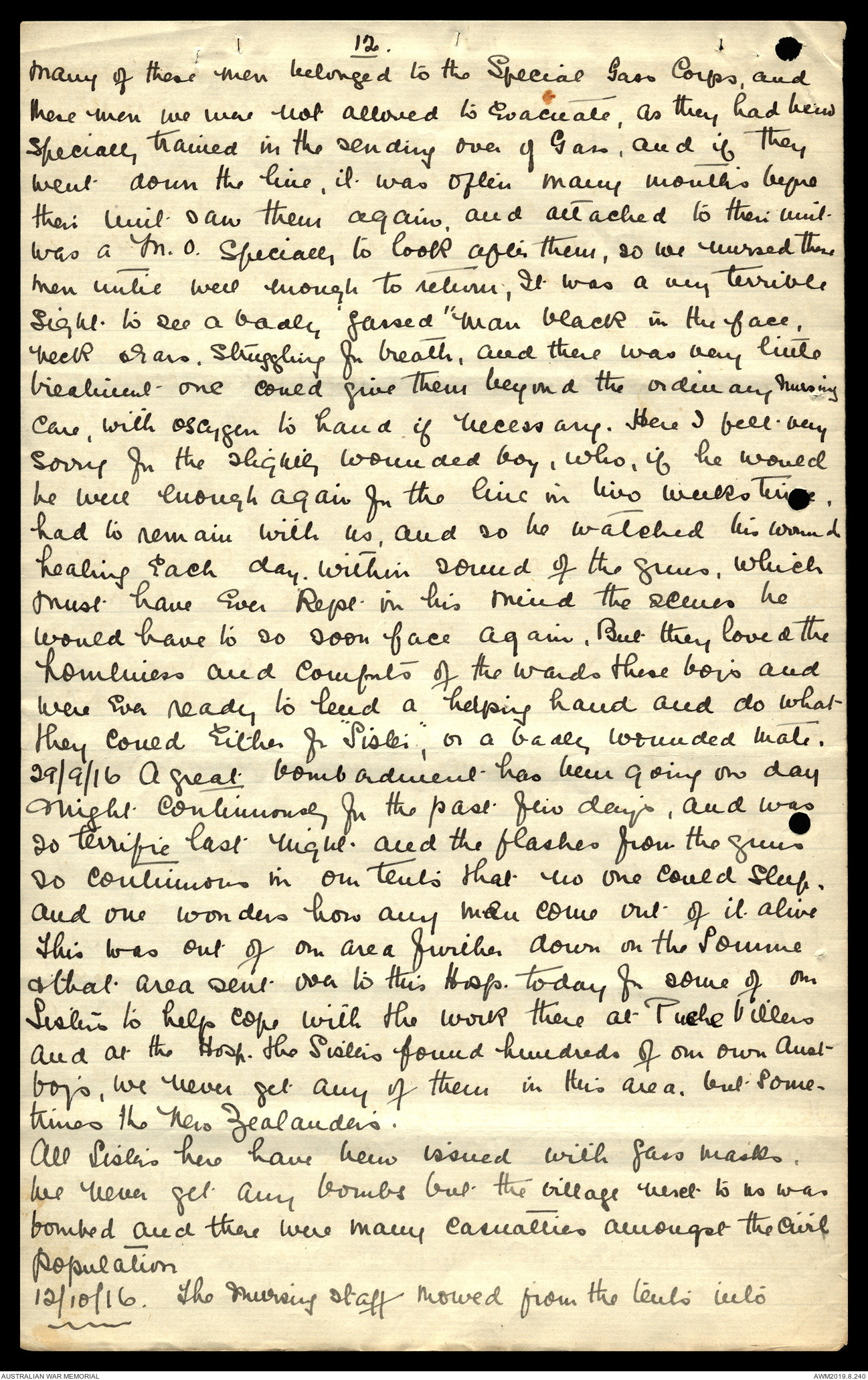
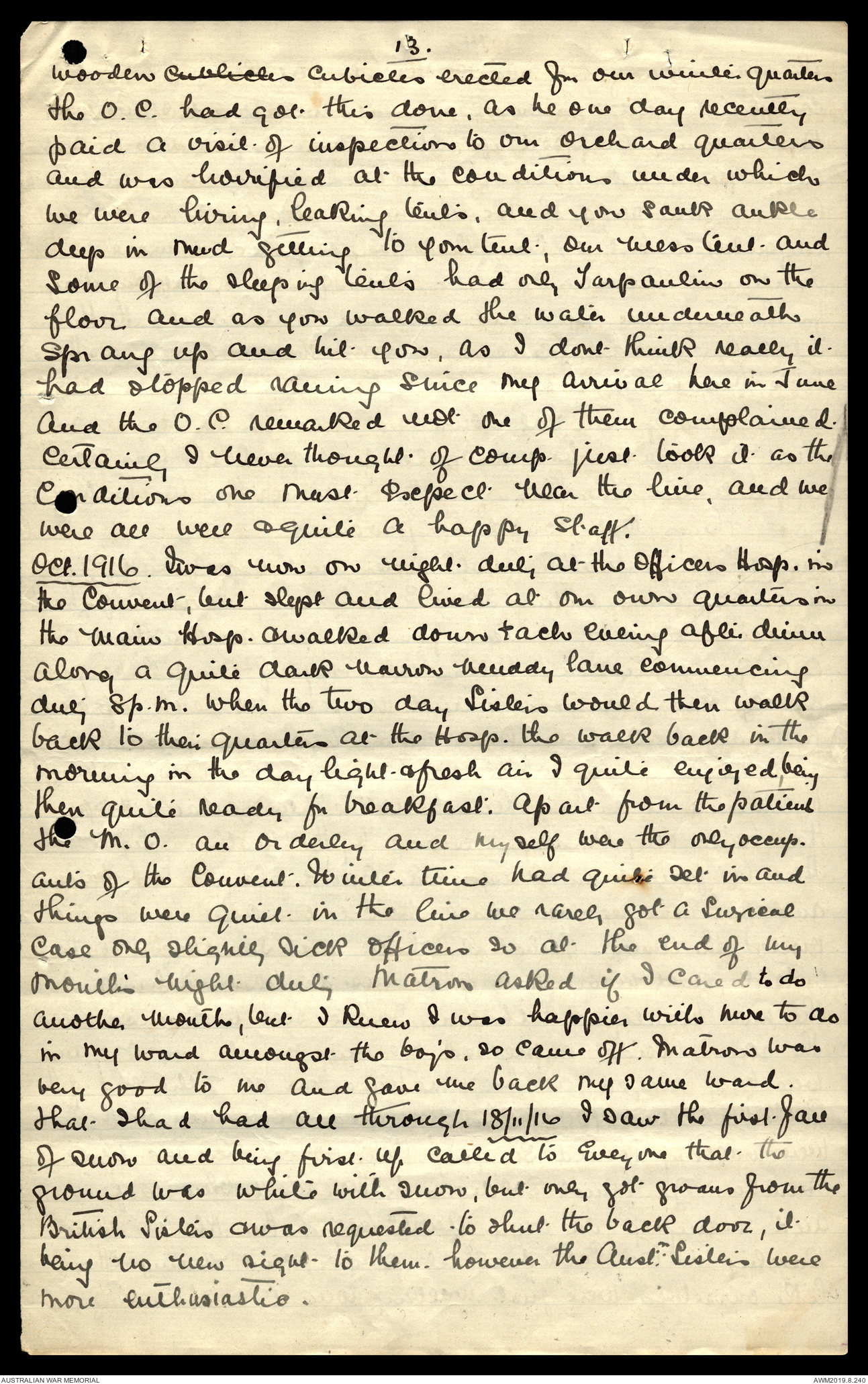
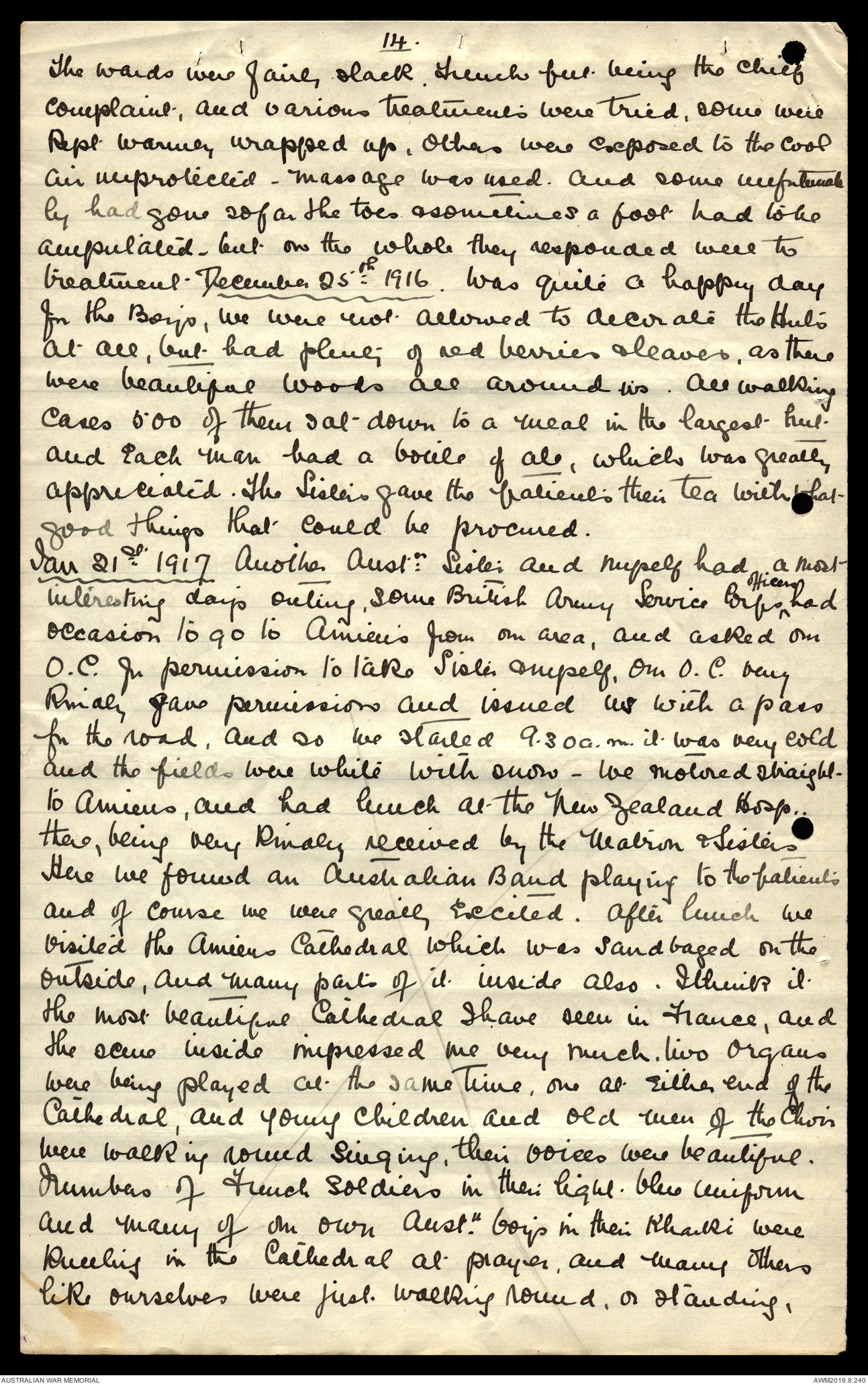
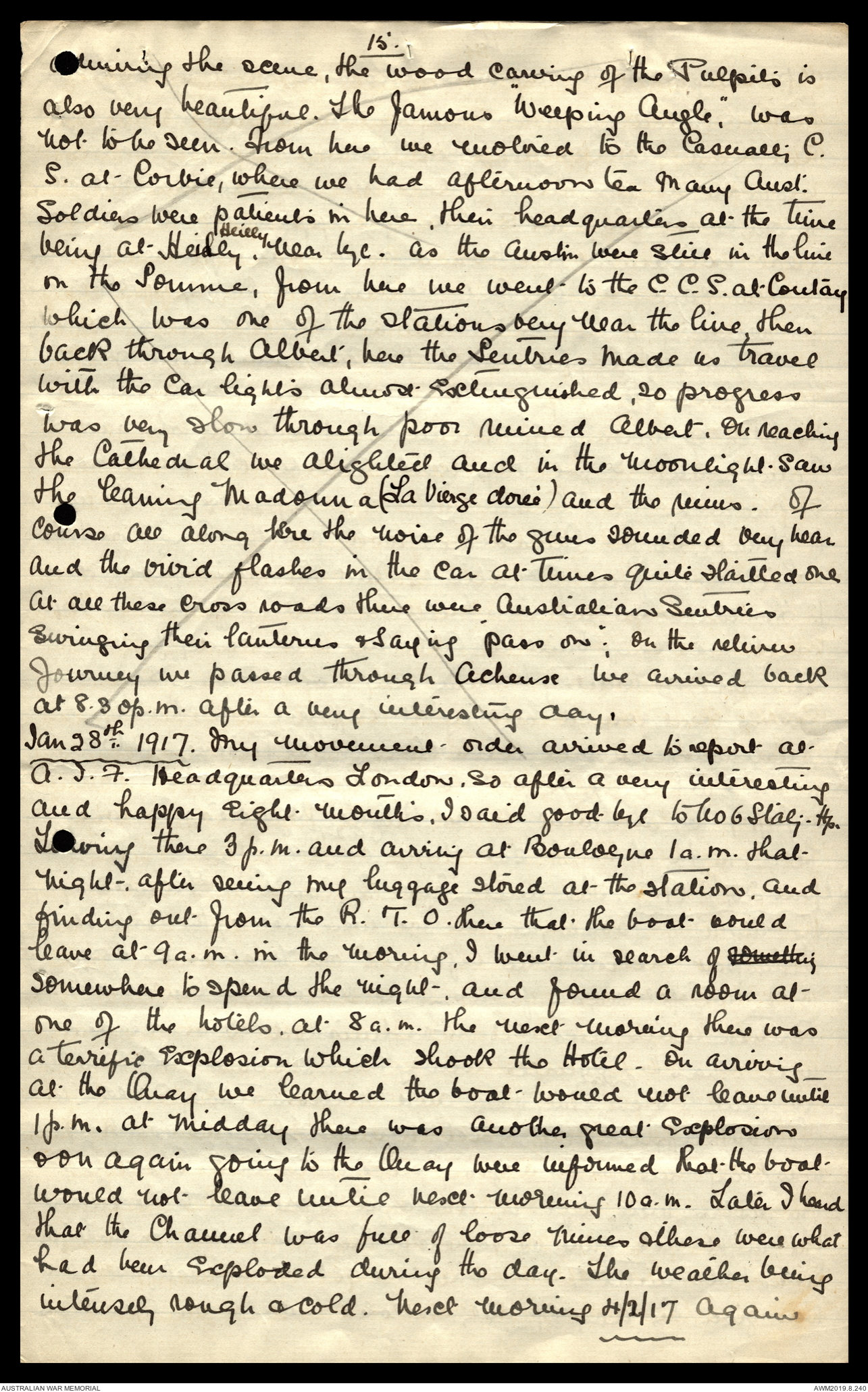
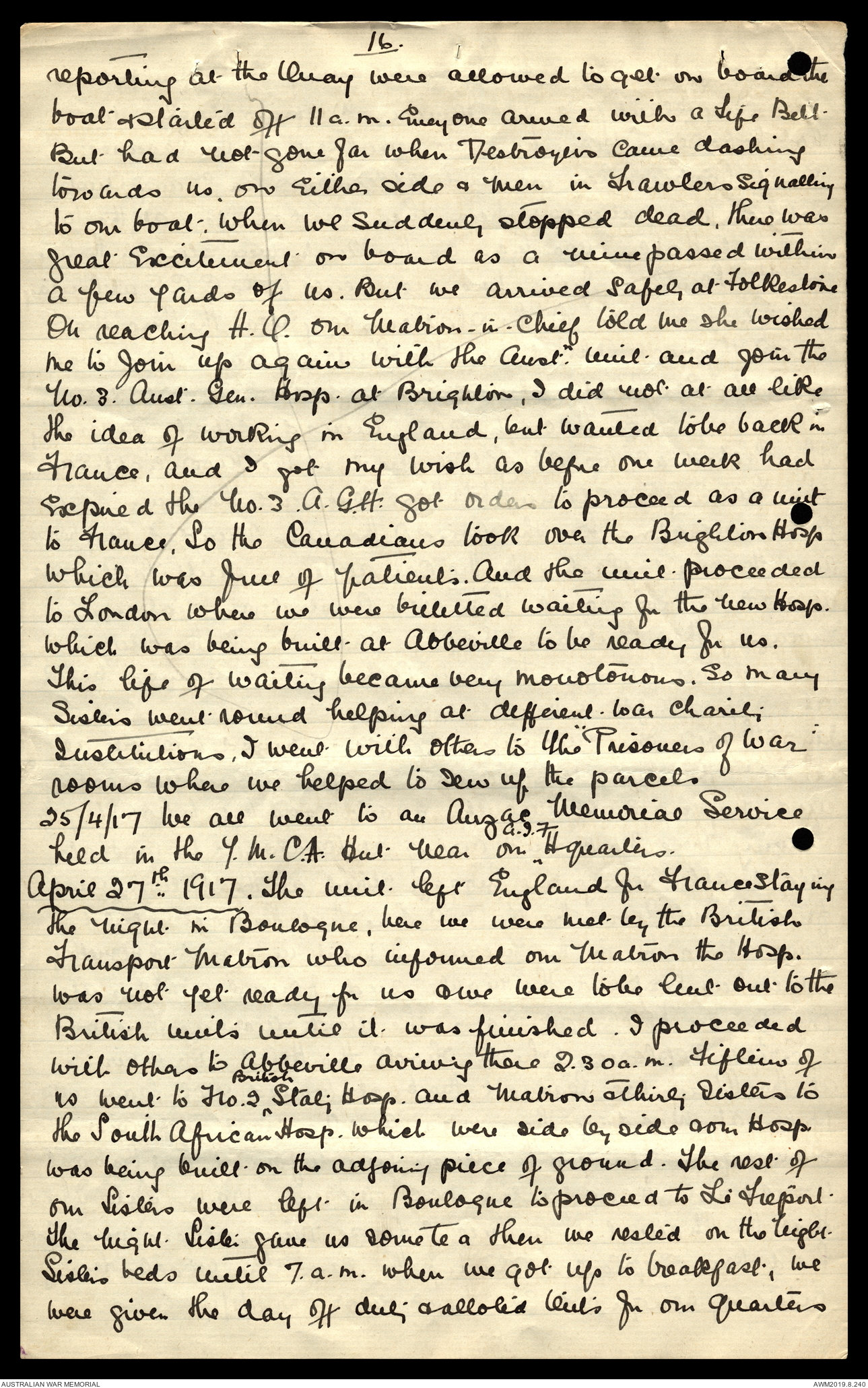
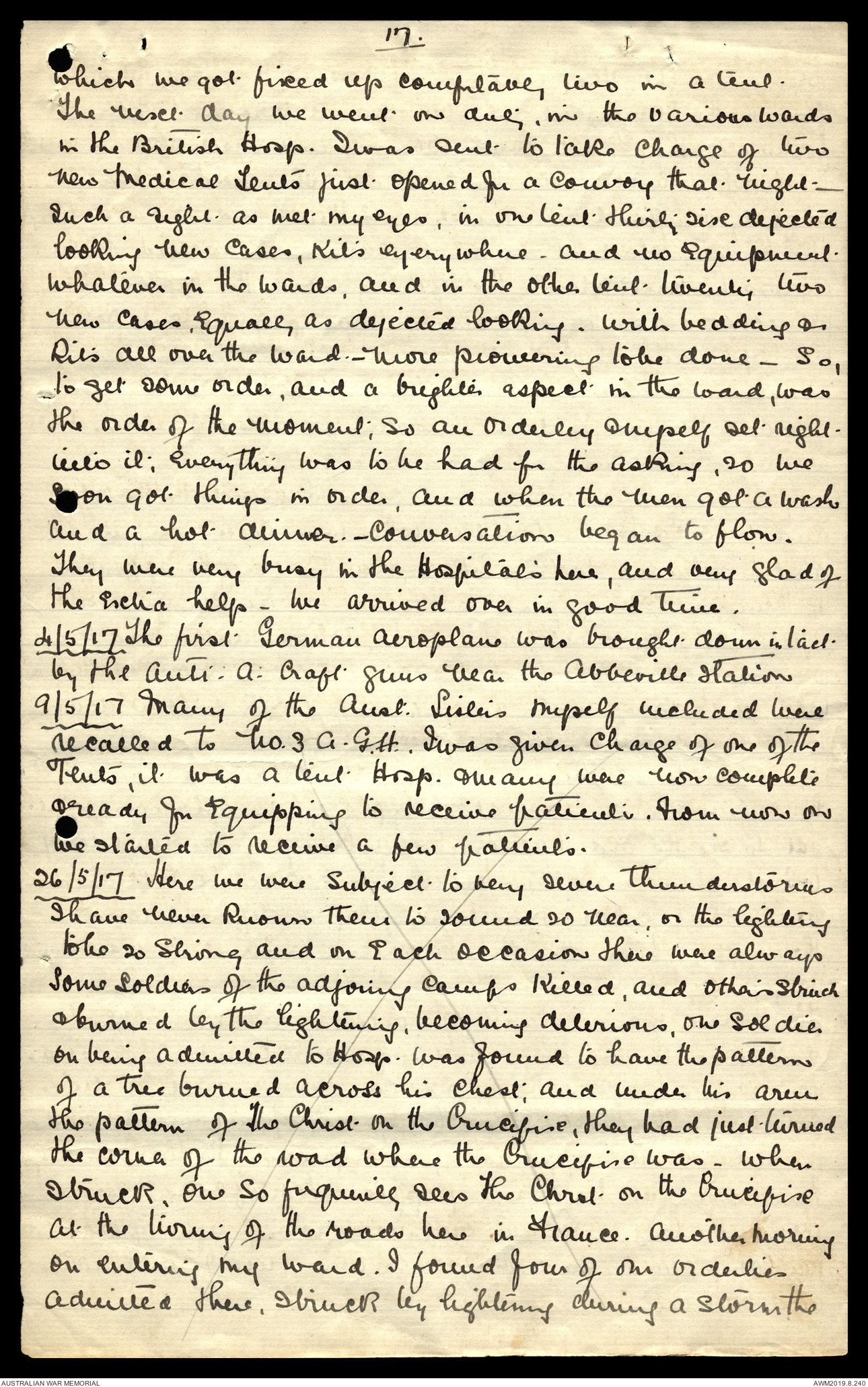
[*Nursing - to A.W.R.S for classification*] [*109/33*]
[*AUSTRALIAN WAR RECORDS SECTION CLASSIFICATION SUB-SECTION E253/2/-*]
MEMO BY SISTER E.H. CUTHBERT A.A.N.S.
No. 1 A.G.H. 1914 HELIOPOLIS: Canal operations January 1915:
1st A.G.H. HELIOPOLIS, during 1915 GALLIPOLI casualties : Transport duty
to Australia, August 1915 : Return on transport : To MARSEILLES on
Transport 'SALTA' : duty with No. 3 British : Duty with No.6 British
Stationary Hospital : "Gas" nursing. - Rejoins A.I.F. Headquarters and
attached No.3 A.G.H. at BRIGHTON.- Accompanies it to ABBEVILLE - Transferred
No 2 A.G.H. BOULOGNE - With it up to 1919.
1.
On Dec 5th 1914 On the Kyarra we (161 Sisters & others) left
Melbourne for a destination unknown, but quite
ready & eager to do our duty and give help wherever
we might get orders to land.
14th Jan 1915. We arrived at Alexandria and after
waiting here for eleven days, which were most enjoyable,
leave being freely given. It was decided
we were to start Hospitals in Cairo, arriving there on
the 24th Jan. I belonging to No 1 A.G.H went to the
Palace Heliopolis, there were no patients and nothing
ready for the Hospital work, so here the pioneering
work was to commence. Our Matron that day
alloted so many for day and night duty (if wanted)
Our quarters here were of course very sumptuous.
25th Jan 1915 Hospital equipment commenced to arrive
and the orderleys soon got busy opening packing cases etc
26th Jan Volunteers were called from amongst the
Sisters for active duty at Port Said, as an attack
on the canal was feared. Almost every sister put
her name down.
27th Jan After breakfast the names chosen were
read out. My name amongst them. Our luggage
not exceeding 80 lbs. to be ready in ten minutes
and given into the Orderley's hands. It was a wild
rush, but the Sisters did my packing for me as I
sorted out the articles required. Then we were paid
in full & assembled 2.30p.m. Six Sisters (6) & fourteen
Staff Nurses (14) we were attached to the Aust. Clearing
Hospital with Medical Officers & Orderley's. A special
train had been engaged & at Cairo we picked up
the No 1 Staty. Hosp. Leaving Cairo 4.30p.m.
At 7p.m in the train we partook of our first
active service meal (How little I knew then, how often I
should be eating Bully Beef) Bully Beef, bread, cheese, & tea.
The officers served it out & looked after us well.
2.
Then we tried to get some sleep switching off the light, left
the intenseness of the desert and the mission upon which
we were bent, was much too stirring for sleep. On reaching
Ismalia the Staty. Hosp. detrained. On leaving Ismalia
we immediately came in sight of the Canal & proceeded
directly beside it, which had sentries all along its banks.
mostly Indians _ We arrived Port Said 12.15a.m. Here we
felt we were really wanted British Officers to meet us
and Gharries in a row waiting for us, all was order &
we got away immediately, even then not knowing where
we were going to. Our destination proved to be a Convent
vacated that day. Twenty one beds made up for us all fresh
and nice, when we had come prepared to sleep anywhere.
Supper was set ready for us, and a native in attendance
We awakened next morning to find dozens of Port Saiders
gazing in our windows at us, and the interest taken in
us all day was immense. The Convent our Hospital was
just beside the Church and in the afternoon there was a double
funeral, two aviators, the coffins being taken into the church
One Frenchman with the French flag over his coffin was taken
in by the French marines. the other a Britisher with the Union
Jack over his coffin and his military cap resting on top, was
carried in by British Marines. These aviators were shot
down by mistake by Indian troops. This scene indeed made
us realise the cause in which we had come so many miles
to give a lending hand.
British, French and Italian war ships were stationed here.
30th Jan 1915. Busy all day getting Hospital ready.
Australian second contingent of men arrived safely at
Port Said and in the evening we went down to the Quay
to see them, the boats looked splendid, too dark to see the
men, and to our great disappointment we were not allowed
on board.
31st Jan Some wounded and a few prisoners were brought in
but not to this Hospital.
1st Feb 1915 We received our first patients.
3.
This attack on the Canal proved to be only a very small affair
although on the night of the 3rd Feb the Turks managed to get
a few pontoons nearly across the canal, which were captured.
The British Medical Authorities had made full arrangements
for a large attack, which I am glad to say did not come off.
We got very few patients and many of them were men
requiring only clean operations and so on Sunday 14th Feb.
the Sisters were all recalled to Cairo, the Medical Officer
and orderlys being left to close up the Hospital, although
we did not get any nursing worth mentioning. It was
all a great experience this getting together of our first
Hospital in an empty Convent, which when all complete
was inspected by the British Medical Authorities who were
greatly pleased with all the arrangements.
On reaching Heliopolis we found many wards open, and
filled with our boys who were sick, most of we
Sisters who had returned were alloted by Matron to the
padding of splints and cutting up of dressings, so
getting supplies together for future use.
April 19th 1915 The first lot of sick men were returned from
Lemnos Island, and they were very sick men indeed.
More wards were opened & equipped, and by now the
Hospital was a very large one.
April 28th 1915. Wednesday we received our first wounded men
at 6.30p.m. The big Red Crescent train arrived just at the
back of our Hospital and our excitement was great when
we saw our poor wounded boys getting out & being helped
out and as they arrived I just felt I could not meet
them all crippled & wounded, but they were all so
wonderfully jolly & brave and just loved to tell you
all about the fight. They were all received in the
big entrance Hall where they were first given hot cocoa & biscuits
and then at the same time their particulars were taken.
Name. No. Nature of wound etc. & then alloted to the various
wards, where they had a bath and change of clothes which
were greatly appreciated ___ we thought those cases were
4.
bad, but it was three days later we got the seriously and
dangerously wounded ones, so many came we had not
enough room, so the less seriously wounded ones, were
all ordered up and get dressed and go down to the
Auxiliary Hosp. and this had to be repeatedly done.
Sometimes the wounded would just arrive, have some
food, a bath, get dressings done, and get to bed
with many exclamations of delight at all this
care and good surroundings, when they would almost
immediately be ordered up again to get dressed for
an Aux. Hosp. as train loads of severely wounded
were just about to arrive, and never once were
hard words spoken of this treatment by the boys.
Their general remark was "We know they are badly
wounded Sister, we saw them lying there in the field
waiting for help, when we were just able to walk
or crawl away."
The wounded were so many more than were expected
or than we had provided for, that the strains and
rush of work, and keeping up of supplies of dressings
was terrific. And many a badly wounded boy
would arrive and only half clad, and the whole situation
was so new to us, that many a Sister when the badly
wounded first arrived, had to at times suddenly
disappear into the pantry to control her feelings for
these poor suffering boys, and their wonderful
patience and endurance, and kindly sympathy
and care for each other, really seemed to make it
harder for we women to bear.
But we soon, very soon, realized that there was work, and
abundance of work to be done, that we were in the very
midst of war, and must learn to take the days and their
sights & happenings, just as they arrived and every
moment was precious, and therefore must not be spent
in giving way to ones feelings, and so one and all
learned to face these sights of strong young manhood
5.
arriving with his body in a torn & wounded condition
It was a hard school, perhaps, learning from ones own kith
and kin from a peaceful far away country, but it
stood us in good stead for the many years of war
that were ahead of us.
With the advance of Summer we got many cases of
sunstroke, who would arrive in a very collapsed
condition, and high temperature, they were frequently ordered
by the M.O. to be taken by an orderly and kept under the
shower for a given period, which greatly revived them
this would be repeated several times, and the temp.
would soon drop to normal, and the patient be
quite fit again in a few days.
August 11th 1915. I went on transport to Australia, having
on board over 900 sick & wounded men, mostly wounded
the greater number being cot cases, many cases were men
who had had discharging wounds for months and
were having dressings done two and three times a
day at the start of the voyage, it was remarkable how
in about one weeks time the discharge lessened and
wounds began to heal, the trip and sea air did
wonders for these cases. We lost only one case of dysentery.
After three weeks holiday at home, I proceeded to Sydney
on the Oct 2nd 1915 to take charge of the same boat which
was now a Transport with some 1500 men on board
Reinforcements for various units. We had very little sickness
during the voyage, the usual inoculations of all
the men, and one case that later in the voyage required
operation - suppurating appendix - We carried only one
M.O in charge of troops at this time, so the ships surgeon
was called to assist, we fitted up an empty cabin
for an operating theatre, there being no theatre on
board. And everything went off very well, and on
arriving at Suez 2nd Nov 1915 our patient was left
at the Hosp. there, instead of undertaking the journey
to Cairo.
Christmas time, English ladies came and decorated
6.
the main entrance halls, which looked very pretty
Sisters & patients decorated their wards, and most of the
Boys hung up their socks overnight. They had a very good
dinner, after which their [[?]] from Aust. were given out
to each man. and a band from one of the units came
and played in the grounds.
By this time Gallipoli was evacuated and no more
wounded men were arriving. During March 1916 we commenced
to close down many of the wards and prepare
generally for our departure to some further field of action.
And so the Sisters embraced this opportunity of applying
for time to see upper Egypt and so in rotation we were
given one weeks leave. On this trip I was one of a party
of five Sisters, going first to Luxor, where we stayed four
days, we engaged a guide who took us many interesting
trips, to the wonderful ruins of the Temple of Karnak
and for a whole days excursion to the Tombs of the Kings
and Queens, which had only been discovered of fairly
recent years, we get there we rode on donkeys.
Another day a very interesting excursion up the Nile, then
we left for Aswan, here seeing the wonderful Aswan Dam.
The Chief Engineer, an Englishman, meeting us and explaining
everything to us, he also placed the Government
Launch at our disposal, and in this we went up to
see the partly submerged Temple of Philae, which naturally
looks rather strange with the many Egyptian figures &
writings on it, standing in the middle of this Dam.
Our intention was to return to Luxor by boat, as there
are many old temples of interest to be seen this way.
The boat was provisioned for the journey, and our guide
who was still with us had all arrangements
made, and we were just about to start, when
at breakfast, I received a telegram to return at once
as the Hosp. was leaving, so we had to return the quickest
way, by train. Then naturally we were interested
to know where we might be moving to, and much
7.
speculation was done by us in this direction. We had
all left our luggage ready packed, so did not have this
to worry about. We arrived Cairo 7a.m. 28th March 1916
and reached the No 1 A.G.H. to find it all bustle and
excitement, no one exactly knew where we were going to
beyond that it was Alexandria. The whole unit
left Cairo 29th March 1916 & proceeded by train to Alex.
And so we said goodbye to Cairo, where we had
known much happiness and many sorrows. And
now our one thought and hope was, that we should
be sent to the same place that our Boys were being
sent to, we wanted so much to still look after them.
30th March 1916. We left Alex. on the Hosp Ship "Salta".
The complete staff of the No 1. A.G.H. being on board. Here
we slept in the different wards, my allotted corner
was in a ward of thirty beds with thirty other Sisters.
The British Hosp. Staff were still on board. One Sister of the
staff a New Zealander with the British, had not so long
before been torpedoed while doing Hospital duty in the
Mediterranean, and had spent seven hours in the water before
being rescued. However she had requested to be again
put on Hosp. ship & was now on the 'Salta'.
During this trip we were not allowed to move without
carrying our life belt with us, up & down decks, and to
every meal, however we arrived safely at Marseilles.
but the 'Salta' was later torpedoed & sunk in the Mediterranean
April 5th 1916. We arrived at Marseilles, and were kept on
board until the 8th April, during which time British
Authorities and our O.C. conferred as to future
arrangements. There being only room enough at Rouen for
a small Hosp. with work for 50 Sisters, the remaining
number were to be lent to British Hospitals, the news
of which caused much unhappiness amongst our unit
which had been one big happy unit up to this time.
Then our Matron was busy making up lists of Sisters
of tens or sixteens with a senior Sister in Charge
8.
and their destinations and we waited to know our
fate, and it came on the night of the 7th. My lot
was to go wandering in charge of nine Sisters, and
my destination Le Treport. I was very unhappy at the
thought of leaving my unit, yet felt pleased that I
was going to see the workings of a British Military
Hospital, and my ten months spent in British
Hosp. in France was a very happy time, as life
went in France.
April 8th 1916 We all left the boat and were billeted
at the Regina Hotel in Marseilles until the 10th when
we all entrained in Special train for Rouen, this was
a long tedious journey, arriving at Rouen on the 12th.
Here a British Hosp billeted us for the night, and
next night, after an interesting day spent seeing
around Rouen, we who were going to British Hosp.
started on our journeys. Myself and party left
Rouen 8p.m. 13th April 1916 and arrived Le Treport
3a.m. that night. There was no one to meet us, it was
very cold and teeming with rain, and not one French
scholar amongst us. The Railway Porter informed
us the journey was finished, it being the terminus of
the line, however, one sister with many gesticulations
informed him we were going to remain in the carriage
until morning, and he left us peacefully alone.
Then we settled for a sleep until daylight, when
we rang up the Hosp. & told them of our arrival
and while awaiting an Ambulance Car, got hot
coffee and something to eat on the station.
15th April 1916. We started duty- I was sent to the
Officers Surgical Wards. There was no Special treatment,
just the ordinary Surgical dressings.
We found many of our own Boys in the men's
wards, and glad we were to meet them again
even if it was in Hospl. This Hosp. No 3. British
General, was situated in an enormous Hotel,
9.
and I thought most inconvenient for working. So many very
small rooms. There were two Canadian and another British
Hosp. in the area. All situated on the sea cliffs, and the
surroundings were very beautiful. After spending two
months in the officers wards, a British Sister from Aust.
Sister and myself got orders to proceed to No. 6 Staty. Hosp.
June 10th 1916 We left Le Treport and arrived at
Abbeville, where we spent the night at a Sisters House
and next day proceeded to No 6 Hospital. arriving there
5p.m. we were met and taken straight to Billetts
in the very small village, where we could be taken only
one in each house, mine being in a tiny very stuffy
room, over a little drapers shop. The English Sister who
accompanied us having been out since the days of Mons
was a fluent French Scholar, and so she did the
housekeeping for us (Army Rations) and the arrangement
was, we all met at her billet for our three meals
the Frenchwoman there doing the cooking and looking
after us. From here we walked to the Hospital, a camp
hospital. The No 2 Casualty Clearing Hosp. having just moved
out, and the 6th Staty staff came up from Havre to
take it over, the day before we arrived, there was nothing
left in the Hosp.- except plenty of patients, not a
broom to sweep the floor with, or a chair to sit on
while writing your report, and the Quartermaster would
not give them out, as he said it should have been
left equipped. I could see some pioneering work ahead.
Here we heard the big guns for the first time, and
aeroplanes circling overhead continuously, we were right
beside the Railhead, here the troops are detrained and
marched to the trenches. This Hosp. was the first receiving
Hosp. behind Arras, where the Field Amb. was situated
Our staff consisted of one Matron and twelve sisters.
The Hosp. comprised mostly huts and a few tents, with an
Officer Hosp. in a convent in the village managed by this staff. Here
also we had numbers of German patients, and the prisoners
10.
cage was just beside the Hosp. where prisoners just taken were
brought for one night only or perhaps just for a few hrs.
About June 17th 1916 It was rumoured that Arras was to
be the scene of another big attack. So Matron said she
must have her staff concentrated, where at any hour of
the night she could get at them at a few moments
notice, where as at the time the whole staff were scattered
over the village. So an orchard adjoining the Hosp. was
commandeered where tents were pitched, and the
Sisters housed two in a tent on the 28th. June we moved
into our new quarters, having one tent for a mess room
I liked tent life very much indeed, but missed my
bath greatly as since leaving No. 3 B.G.H. it had not been
possible to get a bath, just a sponge over from a
small enamel basin, more especially did we feel the
need of a bath, when the big rush of work came
and we found we no more than the soldiers were exempt
from being attacked by the body vermin. It is
a sickening sensation when you first find these creatures
on you, but there is only one thing to do search for them and
change every day.
For some nights before leaving my billet it had not been
possible to sleep much, as from 10 o'clock at night
on, line, after line of heavy artillery going to the front
would pass along the little narrow cobbled street
which shook the houses and even my bed. And one
night the noise being so great and unable to sleep, I put
on my coat & went down to look through the little glass
door of the shop, it was teeming with rain, and the guns
in the line were booming-but all I could see of the
artillery, was a bright cigarette showing from every
soldiers mouth along the whole row, and there was lively
conversation amongst them. Even though the hour was
well advanced in the night and the next night equally
as wet, and the guns booming equally as loudly we were
wakened up at 1 a.m. to the sound of hundreds of beautiful
11
voices singing, this was an Infantry Reg. of Welsh Soldiers
on their way to the trenches, who were halted to rest, and
so they sang hymn after hymn. In about fifteen minutes
time a clear voice called out "Form Fours - March -
and so they passed on in the darkness, the rain, the
cold and the noise to what? Day and night
this continuous stream of men and material
passed along our way. And in the day time they
were so pleased if they met us on the roadway, and
would wave to us and call some message to
"Sister", as they marched along. And the bright smiles
which some boys gave can never be forgotten, and
you knew, that being so near the line, that possibly
you would be the last woman some would ever
see. And this wonderful spirit stayed with them
when a few days later, we received them wounded
in the wards.
Our Hosp. was just a clearing Hosp. Some nights we
would go off duty, leaving an empty ward and could
be called early next morning to be told our ward
was full. All patients to have their dressings
done and some food given them and evacuated
by 8.30 a.m. or again we would have free wards
and an order would come through in the night to
have it emptied and so about 4 a.m. Some day
Sisters would be called to do dressings and get
patients ready for evacuation, not necessarily all the
day staff would be called just a certain number
chosen by the Matron. But of course often we received
patients too ill to be moved for many weeks.
Here I saw for the first time the Carrel Dakin treatment.
Here also we used the Thomas Splints freely for fractured
legs & arms. Our wards were constantly being changed
from one class of patient to another.
25th August 1916. My ward was changed from Surgical into
a "Gassed" ward & was filled with "Drift Gass" patients
* The men were wonderfully patient-slung up in this unnatural
looking position. But after the first 24 hrs. it was wonderful
how comfortably the limbs settled into the splints, & they had
no complaints to make, unless perhaps they had twisted
them while asleep but a little readjustment soon made
them comfortable again. Even with two arms in splints &
suspended and lying flat on his back a patient was still
able to enjoy his cigarette with an ash tray propped
under his chin, he managed quite cleverly, all on his own.
12.
Many of these men belonged to the Special Gas Corps, and
these men we was not allowed to evacuate, as they had been
specially trained in the sending over of Gas, and if they
went down the line, it was often many months before
their unit saw them again, and attached to their unit
was a M.O. Specially to look after them, so we nursed these
men until well enough to return. It was a very terrible
sight to see a badly gassed man black in the face,
neck & ears, struggling for breath, and there was very little
treatment one could give them beyond the ordinary nursing
care, with oxygen to hand if necessary. Here I felt very
sorry for the slightly wounded boy, who, if he would
be well enough again for the line in two weeks time
had to remain with us, and so he watched his wound
healing each day. Within sound of the guns, which
must have ever kept in his mind the scenes he
would have to so soon face again. But they loved the
homeliness and comforts of the wards these boys and
were ever ready to lend a helping hand and do what
they could either for "Sister", or a badly wounded mate.
29/9/16 A great bombardment has been going on day
& night continuously for the past few days, and was
so terrific last night and the flashes from the guns
so continuous in our tents that no one could sleep.
And one wonders how any man come out of it alive
This was out of our area further down on the Somme
& that area sent over to this Hosp. today for some of our
Sisters to help cope with the work there at Puchevillers
and at the Hosp. the Sisters found hundreds of our own Aust
boys, we never get any of them in this area, but sometimes
the New Zealanders.
All Sisters here have been issued with gas masks.
We never get any bombs but the village next to us was
bombed and there were many causalities amongst the civil
population
12/10/16 The nursing staff moved from the tents into
13.
wooden cubicles erected for our winter quarters
the O. C. had got this done, as he one day recently
paid a visit of inspection to our orchard quarters
and was horrified at the conditions under which
we were living, leaking tents, and you sank ankle
deep in mud getting to your tent, our mess tent and
some of the sleeping tents had only tarpaulin on the
floor and as you walked the water underneath
sprang up and hit you, as I dont think really it
had stopped raining since my arrival here in June
And the O. C. remarked not one of them complained.
Certainly I never thought of comp just took it as the
conditions one must expect near the line, and we
were all well & quite a happy staff.
Oct. 1916. I was now on night duty at the Officers Hosp. in
the Convent, but slept and lived at our own quarters in
the Main Hosp. & walked down each evening after dinner
along a quite dark narrow muddy land commencing
duty 8p.m. when the two day Sisters would then walk
back to their quarters at the Hosp. the walk back in the
morning in the day light & fresh air I quite enjoyed being
then quite ready for breakfast. Apart from the patients
the M.O. an orderly and myself was the only occupants
of the Convent. Winter time had quite set in and
things were quiet in the line we rarely got a surgical
case only slightly sick officers so at the end of my
months night duty Matron asked if I cared to do
another month, but I knew I was happier with more to do
in my ward amongst the boys, so came off. Matron was
very good to me and gave me back my same ward
that I had had all through 18/11/16 I saw the first fall
of snow and being first up called to everyone that the
ground was white with snow, but only got groans from the
British Sisters & was requested to shut the back door, it
being no new sight to them, however the Aust. Sisters were
more enthusiastic.
14.
The wards were fairly slack, trench feet being the chief
complaint, and various treatments were tried, some were
kept warmly wrapped up, others were exposed to the cool
air unprotected. Massage was used. and some unfortunately
had gone so far the toes & sometimes a foot had to be
amputated, but on the whole they responded well to
treatment. December 25th 1916 was quite a happy day
for the Boys, we were not allowed to decorate the Huts
at all, but had plenty of red berries & leaves, as there
were beautiful woods all around us. All walking
cases 500 of them sat down to a meal in the largest hut
and each man had a bottle of ale, which was greatly
appreciated. The Sisters gave the patients their tea with what
good things that could be procured.
Jan 21st 1917 Another Aust. Sister and myself had a most
interesting days outing. Some British Army Service Corps Officers, had occasion to go to Amiens from our area, and asked our
O. C. for permission to take Sister & myself. Our O.C. very
kindly gave permission and issued us with a pass
for the road. And so we started 9.30a.m. it was very cold
and the fields were white with snow - we motored straight
to Amiens, and had lunch at the New Zealand Hosp.
there, being very kindly received by the Matron & Sisters
Here we found an Australian Band playing to the patients
and of course we were greatly excited. After lunch we
visited the Amiens Cathedral which was sandbagged on the
outside, and many parts of it inside also. I think it
the most beautiful Cathedral I have seen in France, and
the scene inside impressed me very much, two organs
were being played at the same time, one at either end of the
Cathedral, and young children and old men of the Choir
were walking round singing, their voices were beautiful.
Numbers of French Soldiers in their light blue uniform and m
any of our own Austn. boys in their Khaki were
kneeling in the Cathedral at prayer, and many others
like ourselves were first walking round, or standing,
15.
admiring the scene, the wood carving of the Pulpits is
also very beautiful. The famous "Weeping Angel", was
not to be seen. From here we motored to the Casualty C.
S. at Corbie, where we had afternoon tea Many Aust.
Soldiers were patients in here, their headquarters at the time
being at Heilly nearby as the Austns were still in the line
on the Somme, from here we went to the C. C. S. at Contay
which was one of the stations very near the line, then
back through Albert, here the Sentries made us travel
with the car lights almost extinguished, so progress
was very slow through poor ruined Albert. On reaching
the Cathedral we alighted and in the moonlight saw
the Leaning Madonna (La Vierge Dorée) and the ruins. Of
course all along here the noise of the guns sounded very near
and the vivid flashes in the car at times quite startled one
At all three cross roads there were Australian sentries
swinging their lanterns & saying "pass on"; on the return
journey we passed through Acheux we arrived back
at 8.30 p.m. after a very interesting day.
Jan 28th 1917 My movement order arrived to report at
A.I.F. Headquarters London. So after a very interesting
and happy eight months, I said goodbye to No 6 Staty. Hosp.
Leaving there 3 p.m. and arriving at Boulogne 1 a.m. that
night after seeing my luggage stored at the station, and
finding out from the R.T.O. there that the boat would
leave at 9 a.m. in the morning. I went in search of
somewhere to spend the night, and found a room at
one of the hotels, at 8a.m. the next morning there was
a terrific explosion which shook the Hotel. On arriving
at the Quay, we learned the boat would not leave until
1p.m. at midday there was another great explosion
& on again going to the Quay were informed that the boat
would not leave until next morning 10a.m. Later I heard
that the Channel was full of loose mines & these were what
had been exploded during the day. The weather being
intensely rough & cold. Next morning 4/2/17 again
16.
reporting at the Quay were allowed to get on board the
boat & started off 11a.m. everyone armed with a Life Belt.
But had not gone far when Destroyers came dashing
towards us, on either side & men in Trawlers Signalling
to our boat. When we suddenly stopped dead, there was
great excitement on board as a mine passed within
a few yard of us. But we arrived safe at Folkestone
On reaching H.Q. our Matron-in-Chief told me she wished
me to join up again with the Aust. unit and join the
No. 3. Aust. Gen. Hosp. at Brighton. I did not at all like
the idea of working in England, but wanted to be back in
France, and I got my wish as before one week had
expired the No. 3 A.G.H. got orders to proceed as a unit
to France. So the Canadians took over the Brighton Hosp
which was full of patients. And the unit proceeded
to London where we were billetted waiting for the new Hosp.
which was being built at Abbeville to be ready for us.
This life of waiting became very monotonous. So many
Sisters went round helping at different War Charity
Institutions. I went with others to the "Prisoners of War"
rooms where we helped to sew up the parcels.
25/4/17 We all went to an Anzac Memorial Service
held in the Y.M.C.A. Hut near our A.I.F. Hquarters.
April 27th 1917. The unit left England for France staying
the night in Boulogne, here we were met by the British
Transport Matron who informed our Matron the Hosp.
was not yet ready for us & we were to be lent out to the
British units until it was finished. I proceeded
with others to Abbeville arriving there 2.30a.m. Fifteen of
us went to No. 2 British Staty. Hosp. and Matron & thirty Sisters to the South African Hosp. which were side by side & our Hosp.
was being built on the adjoining piece of ground. The rest of
our Sisters were left in Boulogne to proceed to Le Treport.
The night Sister gave us some tea & then we rested on the night
Sisters beds until 7.a.m. when we got up to breakfast, we
were given the day off duty, & alloted units for our quarters
17.
which we got fixed up comfortably, two in a tent.
The next day we went on duty, in the various wards
in the British Hosp. I was sent to take charge of two
new Medical Tents just opened for a Convoy that night-
such a sight as met my eyes, in one tent thirty six dejected
looking new cases, kits everywhere, and no equipment
whatever in the wards, and in the other tent twenty two
new cases, equally as dejected looking with bedding &
kits all over the ward - more pioneering to be done - So,
to get some order, and a brighter aspect in the ward, was
the order of the moment. So all orderlys & myself set right
into it, everything was to be had for the asking, so we
soon got things in order, and when the men got a wash
and a hot dinner - conversation began to flow.
They were very busy in the Hospitals here, and very glad of
the extra help - we arrived over in good time.
4/5/17 The first German aeroplane was brought down intact
by the Anti. A. Craft guns near the Abbeville Station
9/5/17 Many of the Aust. Sisters & myself included were
recalled to the No. 3 A.G.H. I was given charge of one of the
tents, it was a tent Hosp. & many were now complete
& ready for equipping to receive patients. From now on
we started to receive a few patients.
26/5/17 Here we were subject to very severe thunderstorms
I have never known them to sound so near, or the lightning
to be so strong and on each occasion there was always
some soldiers of the adjoining camps killed, and others struck
& burned by the lightning, becoming delirious. One soldier
on being admitted to Hosp. was found to have the pattern
of a tree burned across his chest, and under his arm
the pattern of the Christ on the Crucifix, they had just turned
the corner of the road where the Crucifix was - when
struck. One so frequently sees the Christ on the Crucifix
at the lining of the roads here in France. Another morning
on entering my ward I found four of our orderlies
admitted there, struck by lightning during a storm the
 Jacqueline Kennedy
Jacqueline KennedyThis transcription item is now locked to you for editing. To release the lock either Save your changes or Cancel.
This lock will be automatically released after 60 minutes of inactivity.